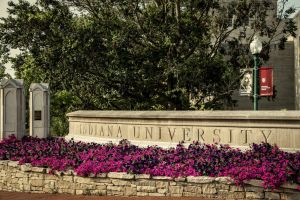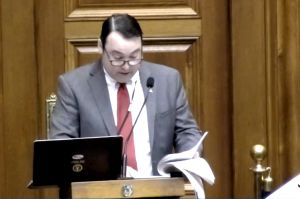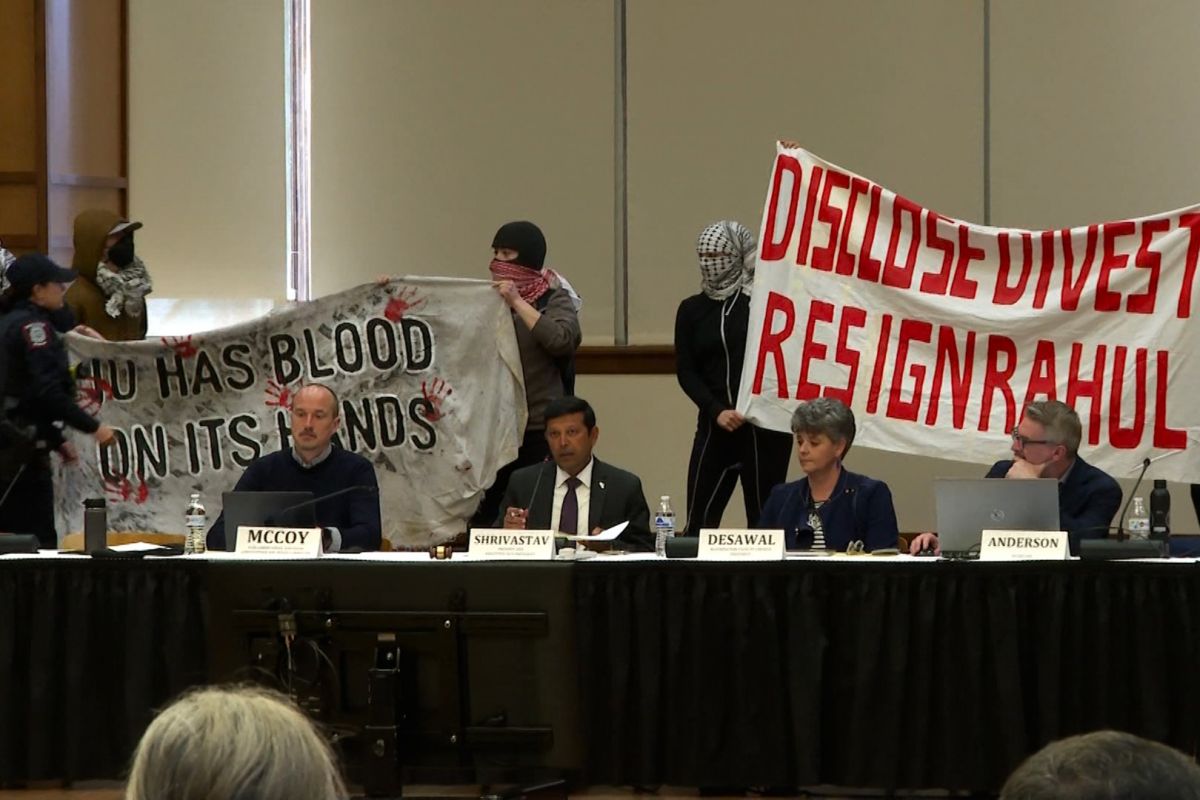
Protesters stand behind Provost Rahul Shrivastav and leader of the Bloomington Faculty Council meeting on March 25. (Alaina Davis, WTIU)
In a typical Faculty Council Meeting on March 25, Provost Rahul Shrivastav delivered standard remarks about the IU Bloomington campus.
In the middle of his remarks, about 10 silent protesters wearing keffiyehs dash behind the provost. Carrying signs saying “disclose, divest, resign Rahul” and “IU has blood on its hands,” they’re quickly and quietly escorted out by an IU Police officer without acknowledgement from the provost.
Like other universities around the country, IU’s community has seen protests — and arrests — since a Hamas-led attack on Israel on Oct. 7, 2023. Groups such as the IU Divestment Coalition continue to organize for Palestine, calling on IU leaders to resign and cut ties with Israel. Meanwhile, some Jewish students report they’re afraid on campus.
College protesters — and their right to free speech — are at the heart of President Donald Trump’s mission to curb what he calls antisemitism. His administration warned IU Bloomington and 59 other schools this month that they could lose federal funding if they don’t protect Jewish students.
Read more: IU among 60 universities warned by Trump administration to prevent antisemitism
Read more: Braun orders review of college antisemitism responses, policies
After the warning, Gov. Mike Braun initiated a review of colleges’ responses and policies, calling universities the “epicenter” of antisemitism.
IU officials did not respond to requests for comment.
Despite IU’s problems, some say it could be worse
Rachel Applefield, an IU senior, said the campus community sometimes feels afraid and frustrated.
“Some of these protests, I'm scared,” she said. “Someone needs to be like, Hey, cut it out.’”
Applefield said she still sees antisemitism and anti-Israel issues on campus today, even when her non-Jewish friends don’t. To Applefield, protesters against Israel and for Palestine are “broadcasting views that they think are peaceful, when really they don't care to understand that it feels very threatening to us.”
Applefield says despite IU’s problems, it’s better than other schools.
Read more: Anti-war protesters at IU disrupt Bloomington campus tours
The federal government cancelled about $400 million in federal funding for Columbia on March 7 because of “persistent harassment of Jewish students.” To keep the funding, the university conceded to the Trump administration's demands.
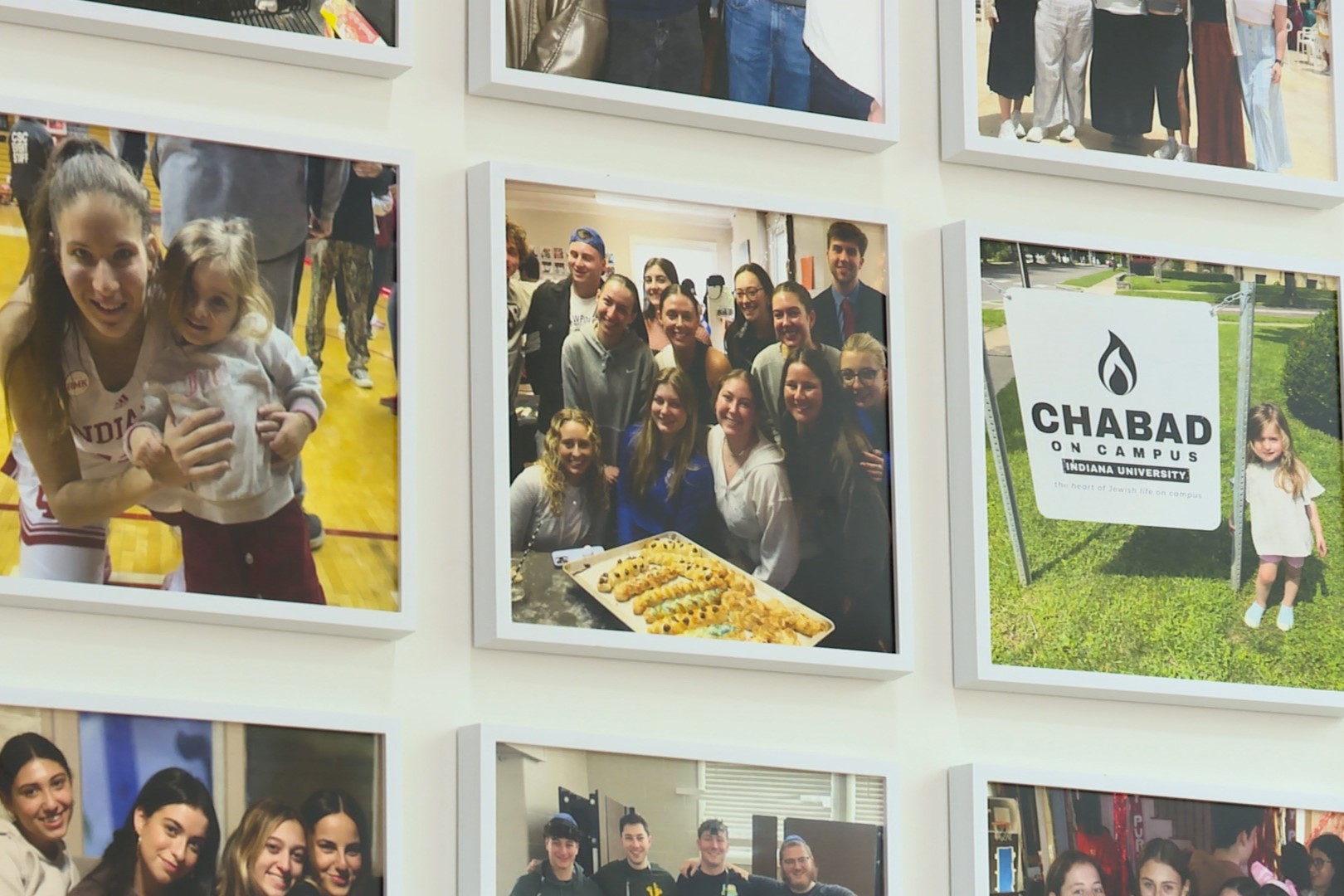
“There are plenty of things that need to be fixed and just basic safety and support for the Jewish community,” Applefield said. “But when you're looking at Columbia, Harvard [University] and all these other schools in the news, we're not even close to how violent and scary it is to go to class.”
Schools using federal funds are obligated to protect all students. Title VI of the Civil Rights Act of 1964 prohibits discrimination based on race, color and national origin for institutions receiving federal funding.
IU Bloomington has one open Title VI investigation for national origin discrimination based on religion.
Read more: A ‘light’ for the Jewish community: IU and Bloomington groups memorialize Oct. 7 attack
Rabbi Levi Cunin said he works with thousands of Jewish students with Chabad at IU. It’s a proud, vibrant, strong community that’s deeply connected to Israel.
Cunin said IU was misrepresented by the Title VI warning.
“In my personal view, I think that Indiana University did a great job handling and protecting the rights of those that were being harassed, harmed, and discriminated against,” Cunin said.
Cunin said any serious incident directed at Jewish students or other minorities should be looked into. He said free speech is for a free flow of ideas, not to harass, harm or intimidate people based on their race, nationality or religion.
“The freedom of speech is here to help people around us be better,” Cunin said. “It's not here to terrorize or harm or discriminate against others. So, let's make everyone around us better and let's spread more love around us.”
Warning prompts concerns about free speech from Jewish professors
In addition to freezing funding over antisemitism, federal agents have arrested student protesters who are in the country legally. Mahmoud Khalil of Columbia and Rumeysa Ozturk of Tufts University are examples.
Some IU Jewish professors, such as Jeffrey Isaac, are concerned that the Trump Administration's actions could chill free speech.
“It’s very disturbing to us that it's being justified as a way of defending Jewish people, defending us,” Isaac said.
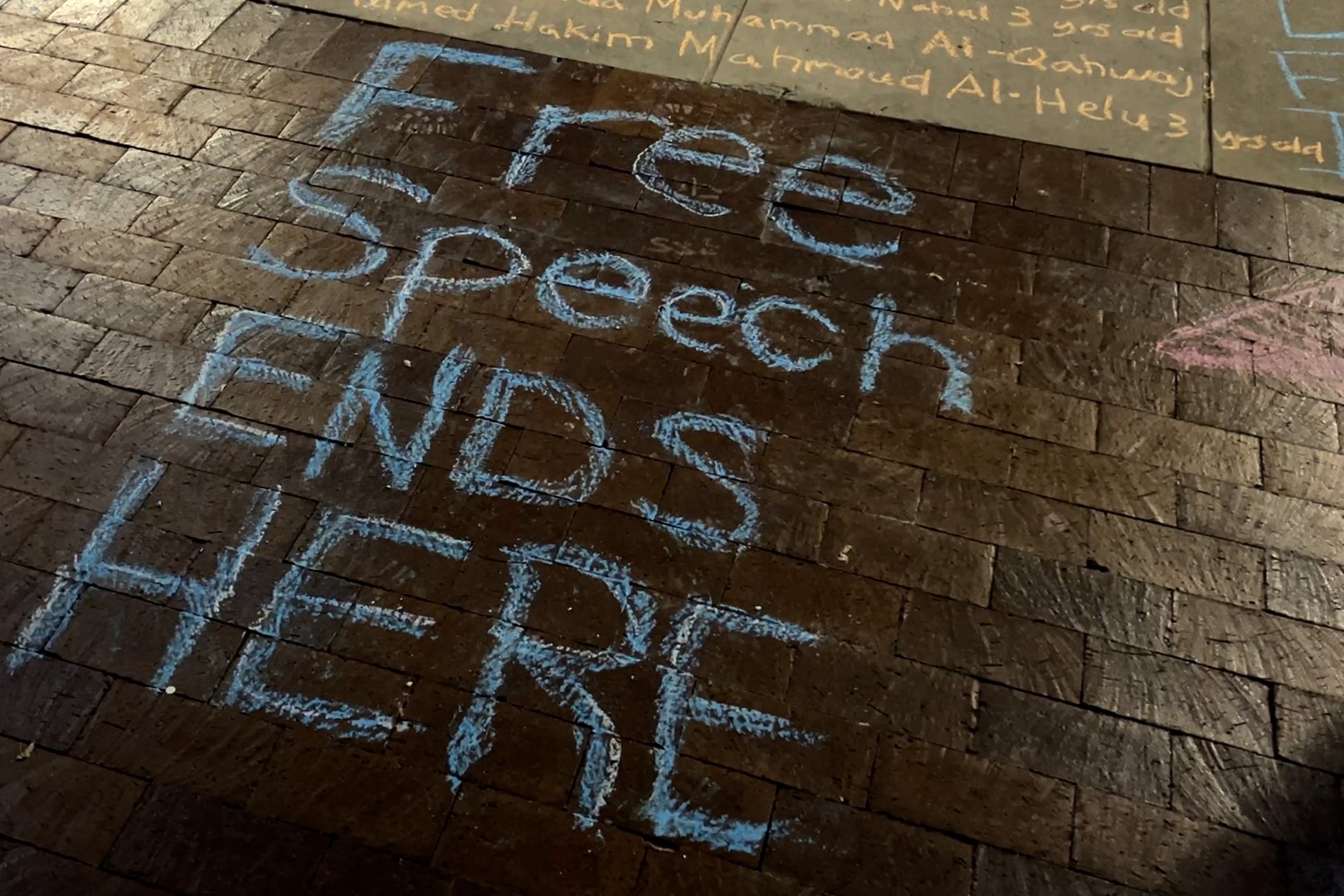
In reaction to sustained encampment protests in Dunn Meadow by the IU Divestment Coalition and supporters of Palestine, university leaders changed its expressive activity policy. Some in the IU community hosted late-night gatherings at the Sample Gates to protest the new expressive activity curfew. (George Hale, WTIU)
More than 30 professors sent an open letter to Shrivastav, President Pamela Whitten and board of trustees chairman Quinn Buckner. The professors wrote they don’t want their names invoked to suppress free speech or academic freedom at IU.
They wrote they have all been “Jewish students on campus” and experienced antisemitism.
"But we also know that our identities, both as Jewish Americans and as public university employees, require respect for free speech and tolerance of opposing viewpoints,” the letter said. “Those values lead us to remind you that IU has a responsibility to stand firmly for freedom of speech.”
Read more: Jewish professors urge IU leaders to protect free speech amid federal antisemitism investigation
Isaac said IU’s recent reactions to pro-Palestine and anti-war events on campus are cause for concern.
Last spring, IU leaders received widespread criticism for suspending the advisor of the Palestine Solidarity Committee, canceling a Palestinian artist’s exhibition and, most notably, calling in the state police to arrest dozens of protesters in Dunn Meadow.
Isaac said the professors hope this year, Whitten will react differently.
“The mistakes of the past don't need to be repeated,” Isaac said.
To Isaac, harsh criticism of Israel is not antisemitic, and it’s dangerous to conflate the two ideas. Being offended by protests is different from being harmed, he said.
“I don't mean to question every person who says they're afraid,” Isaac said. “We need to listen to them, but that's different than saying we need to shut down anything that disturbs them. And that's what's going on in this country now.”
Aubrey is our higher education reporter and a Report For America corps member. Contact her at aubmwrig@iu.edu or follow her on X @aubreymwright.









